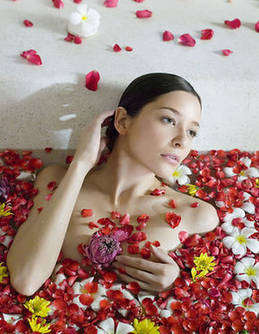走在大街上總能看到各種各樣的Spa廣告和招牌。大家可能大概知道spa這個(gè)詞肯定跟身體護(hù)理和保健有關(guān)。但它背后真正的意思你知道嗎?
The term spa is associated with water treatment, spa towns or spa resorts (including hot springs resorts) typically offer various health treatments.
Spa指水療,凡是與spa相關(guān)的地方(包括溫泉度假村)一般都提供各種各樣的身體保健項(xiàng)目。

The term is derived from the name of the town of Spa, Belgium, whose name is known back to Roman times, when the location was called Aquae Spadanae, sometimes incorrectly connected to the Latin word "spargere" meaning to scatter, sprinkle or moisten. It had springs of waters with reputed healing properties.
Spa這個(gè)詞來(lái)源于比利時(shí)一個(gè)叫spa的小鎮(zhèn),這個(gè)小鎮(zhèn)在羅馬時(shí)代就存在了,當(dāng)時(shí)叫做Aquae Spadanae,有時(shí)也被誤當(dāng)作拉丁文的spargere,即“拋灑、滋潤(rùn)”的意思。這個(gè)小鎮(zhèn)的泉水因?yàn)橛兄委煿πФ鵀槿怂?/p>
By 1626 we have a citation for an English Spa and by 1777 the name of the town of Spa became truly generic so that any town with a hot spring where you could soak your ills away was called a spa.
1626年,English Spa這樣的說(shuō)法首次出現(xiàn)。到了1777年,spa小鎮(zhèn)已經(jīng)聲名遠(yuǎn)揚(yáng),以致于任何有溫泉且能驅(qū)除疾病的地方都取名叫做spa。
It wasn’t until about 1960 that people began opening health clubs and calling them spas without having a hot-springs on the premises.
不過,人們?cè)跊]有溫泉的地方開設(shè)保健中心并取名叫spa卻是1960年的事情了。
After that everyone wanted one; in 1974 you could get an aerated bathtub in your own house and call it a spa.
自那以后,spa開始遍地開花。到了1974年,你可以在自家浴缸里泡個(gè)熱水澡,并稱之為spa。
相關(guān)閱讀
(中國(guó)日?qǐng)?bào)網(wǎng)英語(yǔ)點(diǎn)津 Helen)
點(diǎn)擊查看更多英語(yǔ)習(xí)語(yǔ)和新詞
